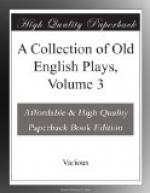Fue. Bishopp, I doe voutsafe it; theres
thy ringe.
[Gives
him the ringe.
Tur.—And you agayne a basse most scurvye thynge.
[Exe. Turp., Fue.
Enter La Busse.
Char. Howe nowe, La Busse? What newse from Ganelon?
Bus. Suche as can come from sorrowe:
he is all
Wretchednes and mysfortune, and in me
Speaks to your sacred goodnes to be pleasd
Voutsafe to call your fayre dove to your fyst
(Mercye I meane) that may abate the stroake
Of your sharpe eagle justyce, and you will
Be wrytt the best of prynces.
Char. Come, no more: Your fathers sentence is irrevocable.
Bus. Yet, gratyous Sir, sende hym hys honors backe And for those fewe pore howers he hathe to breathe Let hym injoy those deare companyons.
Char. You are the good sonne of an evyll
man
And I comend your vertue, but thys suyte
Is past all restytution: to thys prynce
I’ve given all your father governed.
Rich. Which, royall sir?
Char. Cossen, no more; I know your modesty.
... ... ... your languadge; hees my foe
That next solycytts me for Ganelon.
Bus. O doe not make me, sir, be impyous,
For shoulde your breathe crushe me to attomyes,
Yet whylst my memorye can call hym father
I must invocke you for hym.
Char. Which to prevent
Take my last resolutyon, & from it
Swearve not in thyne alleagance: when thou shalt
Meete me uppon a way was never usd
By horse nor man, and thou thy selfe dost ryde
On neyther horsse, mare, asse, & yet thy beast
An usuall thynge for burthen, thou thy selfe
Neyther uncloathd nor naked, & shalt brynge
Thy greatest frend & greatest enemye
Coopld for thy companyons; then I vowe
To doe thy father honor, but tyll then
My mallyce hangs about hym.—Come, coossen,
attend us.
[Exe. Char., Rich.
Bus. Then dye, pore Ganelon.
When I shall meete
The kynge on no hye way, when I shall ryde
Uppon no beast & yet a beast of burthen,
Be neyther nakt nor cloathed, in my hande
My greatest frende & greatest enemye;
And but then get his favor. There is no sphynxe
That can absolve thys ryddell: well, tys decreed
Ile breake my brayne but Ile performe the deede.
Did. Sir, would it were in me to helpe your fortune.
Bus. It was in you to bringe us to thys
fortune.
But I am charmd from anger: onlye thus
My father badd me tell you that he hathe
Not many howers to live, & dothe desyer
To parte in peace with all men, even with you
Whom he hathe nowe forgiven hartylie;
And if you please to vissytt him you may
Fynde love without captitulatyon [sic].




